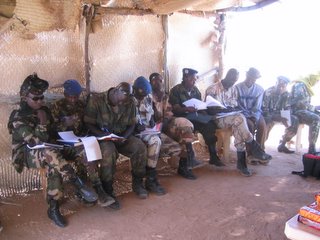More on the Adre attack
Chad blames Sudan after rebel raid, invokes right of pursuit
Chad blamed its neighbour Sudan for a rebel raid on an eastern garrison and announced it was exercising its right to pursue the attackers on Sudanese soil.
"The (Chadian) government holds the Sudanese government wholly responsible for this morning's attack, mounted from its territory," said a spokesman in a statement released in Ndjamena.
Chadian "government forces are now using their right of pursuit to ward off any further threat" against the border town of Adre, added Hourmadji Moussa Doumgor.
It was unclear Sunday afternoon who controlled Adre.
The spokesman said the early morning attack on Adre's garrison was mounted by army deserters allied with a recently formed rebel group called the Rally for Democracy and Liberty (RDL), which Chad accuses of being a "militia used by the Sudanese government."
He said about 100 of the attackers were killed, a toll that could not be independently confirmed.
About 30 people were injured in the fighting and a helicopter accident, according to the international medical charity Medecins Sans Frontieres (Doctors Without Borders), which runs a surgical unit in the hospital.
Two rockets, apparently launched as a result of the helicopter accident, fell on the hospital, injuring people both inside and outside the facility, according to an MSF spokesman in Paris.
The Chadian government statement said the attackers had been "surprised by our forces who had been expecting them for several days and dealt them a bruising defeat," the spokesman said.
Late Sunday a Chadian military officer said another 80 rebels were killed in a second assault on the town in the afternoon. "We repulsed them into Sudan," he said, requesting anonymity. He said two Chadian soldiers were also killed.
Contacted by satellite phone, senior RDL official Abdoulaye Abdelkerim claimed his men had taken control of Adre. The same claim had been made Saturday night only to be contradicted by several sources.
A diplomat in the capital said the army still held Adre. "There was an attempt to take it over but it failed," the envoy said.
But an aid worker, citing colleagues in Adre, said the town had fallen.
Recent weeks have seen a volley of accusations between Ndjamana and Khartoum, with Chad charging that Sudan has been happy to host its rebels and a growing wave of army deserters in order to destabilize Chad.
Sudan has said Chad had already deployed planes and troops on its territory before the latest incident, allegations denied by Ndjamena.
Several new rebel groups have sprung up recently in eastern Chad, which plays host to some 200,000 refugees from the civil war in Sudan's Darfur region
Chadian Rebels Kill 100; Chad Blames Sudan
By LYDIA POLGREEN
DAKAR, Senegal Dec. 18 - At least 100 people were killed in an attack by a rebel group on a town in Chad near its border with Sudan, Chadian officials said, the latest violence to erupt on the long, porous border between the two troubled nations.
A rebel group made up largely of deserters from Chad's army attacked the town of Adré early Sunday morning, Hourmadji Moussa Doumgor, Chad's minister of information, told Reuters.
He blamed the Sudanese government, saying it backed the rebel group, known as the Rally for Democracy and Liberty. The group is demanding that President Idriss Déby of Chad step down.
The attack comes as Chad struggles with a tide of financial, security and political woes. Mr. Déby seized power in 1990, ending a bloody civil war that had tortured the country on and off since its independence in 1960. While Mr. Déby is credited with bringing stability and, under pressure, multiparty democracy to Chad, divisions within the country's powerful military and the ruling Zaghawa tribe have undermined his authority.
Between 600 and 800 soldiers have defected to create a new rebel group in the eastern part of the country. Mr. Déby dissolved his Presidential Guard earlier this fall and replaced it with a new security force, a move widely seen as indicative of his mistrust of elements of the military.
A vast, landlocked nation roughly three times the size of California, Chad has struggled to absorb hundreds of thousands of refugees who flooded across its border with the Darfur region of Sudan, where ethnic warfare rages. At least 200,000 people have been killed in Darfur and millions have been forced from their villages.
The conflict in Darfur, in which several rebel groups, including one led by the Zaghawa tribe, are fighting the Sudanese government and the Arab janjaweed militias allied with it, has threatened to engulf Chad as conflicts have erupted along the border between the two nations.
With less than 3 percent of its land arable and little industry, Chad is desperately poor. The government had agreed to spend most of its profits from oil, discovered there in 1973, on poverty reduction. But in October, just as the revenues began to flow, the government changed its mind.


